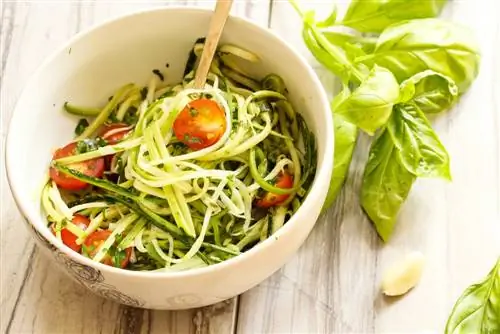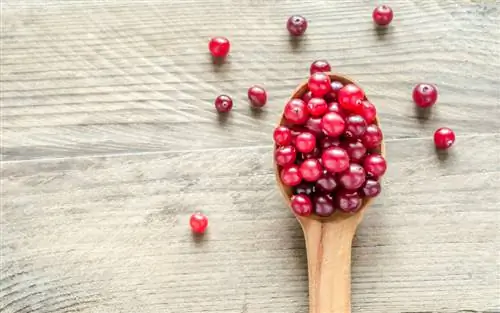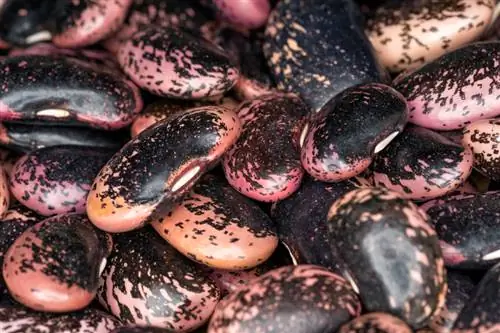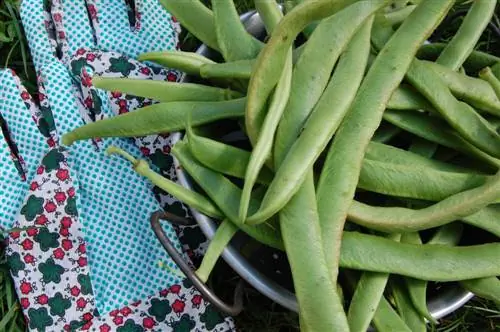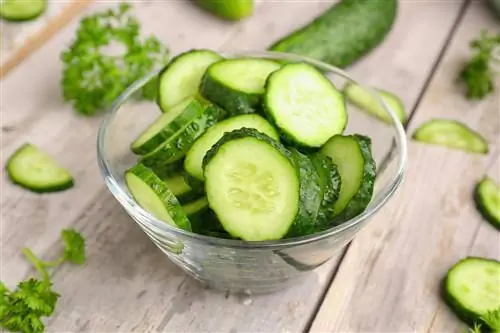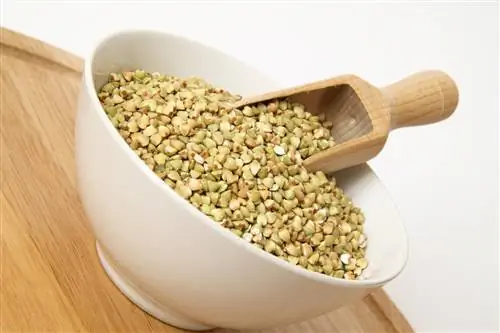- Author admin leonars@hobbygardeners.com.
- Public 2023-12-16 16:46.
- Last modified 2025-06-01 06:02.
Raw food fans cast covetous glances at crisp, fresh zucchini. The question inevitably arises: Can you eat zucchini raw? This guide explains when you can access it without worry. The circumstances under which caution is required are not hidden from you here.
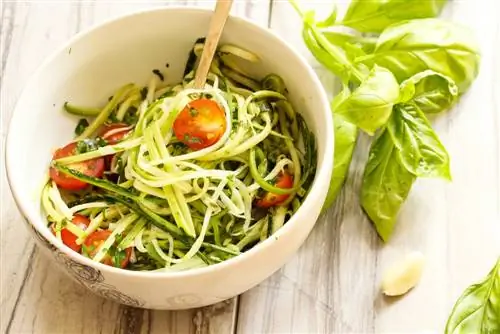
Can you safely eat zucchini raw?
Zucchini can be eaten raw if they come from the supermarket or organically grown. Purchased zucchini should be peeled and organic zucchini should be washed thoroughly. Be careful with home-grown zucchini: a taste is recommended to rule out toxic bitter substances.
- Bought zucchini can be eaten peeled and raw.
- Organic zucchini from certified cultivation can be eaten raw with the peel on.
- Hobby gardeners first do a taste test to rule out the possibility of toxic bitter substances in home-grown zucchini.
Eating zucchini raw - safe or risky?
Zucchini is a mild, spicy dish that is rich in vitamins and low in calories. However, the many benefits do not provide the green light for carefree raw consumption. Under certain circumstances, the seductive zucchini is full of toxic cucurbitacins, which, even in small quantities, can cause serious symptoms of poisoning. Pesticides and bacteria make eating raw with the peel a he alth balancing act. The following table shows when raw consumption of zucchini is safe and risky:
| safe | what to do? | risky | what to do? |
|---|---|---|---|
| from the supermarket | peel, enjoy raw | homegrown | Intersection, avoid stress |
| from the weekly market | peel, eat raw | bitter taste | throw away |
| from the he alth food store | wash, eat with peel | with peel (not organic) | peel |
As this overview shows, there is no monosyllabic answer to the question: Can you eat zucchini raw? Carefree enjoyment always depends on the path the zucchini traveled until it promises a he althy treat for the palate on the kitchen table at home. This results in the right preparation up to the hearty bite into the crunchy fruit vegetables. You can read more in-depth explanations of all options in the following sections.
Zucchini purchased commercially are special varieties without cucurbitacins and can be eaten raw without hesitation.
What are cucurbitacins?
Cucurbitacins are poisonous bitter substances that can be contained in zucchini and other cucurbits. Even small amounts can cause serious poisoning in humans, such as vomiting, diarrhea, stomach cramps and circulatory failure. Unfortunately, these bitter substances are extremely heat-resistant and very poorly soluble in water. This fact makes cucurbitacins so dangerous because conventional cooking does not destroy the toxins. It therefore doesn't matter whether you eat zucchini raw or cooked. With a high concentration of bitter substances, he alth problems are inevitable.
When and how are raw zucchini safe?
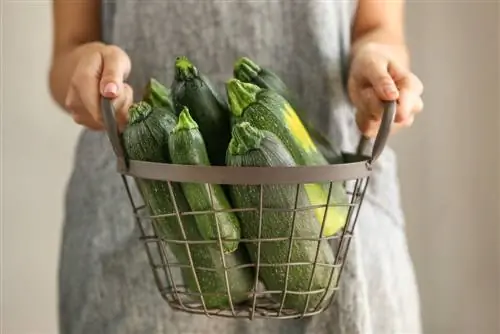
Organic zucchini can also be processed raw with the peel on
The all-clear can be given for zucchini from the supermarket regarding toxic bitter substances. The delicious green fruits have a good time because they grow splendidly without cucurbitacins. The toxic ingredients have been bred out of all varieties, so you can also eat yellow zucchini raw. Nevertheless, a shadow falls on raw zucchini because contamination from pesticides makes eating them with the peel a risky undertaking. All fruits that do not come from certified organic cultivation are affected. The following tips explain when and how you can eat raw zucchini without worry:
- commercial zucchini: peel, eat raw or chop uncooked into salad
- Organic zucchini: wash thoroughly and eat raw with the peel on as a salad, on bread or with dip
Organic zucchini are clearly the best if you want to eat the delicious vegetable raw. Certified organic farmers consistently avoid the use of pesticides. Conventional zucchini from the store shelf often comes with a contaminated skin. In the worst case, unpeeled enjoyment is punished with excruciating flatulence. However, most of the vitamins and trace elements are located directly under the shell. If you can't bring yourself to peel a zucchini, you should at least wash the peel carefully and scrub it with a brush.
Excursus
Eating raw foods poses a potential danger
Zucchini is not the only vegetable that can be hard on our stomachs as a raw food. Caution is also advised when eating raw potatoes, tomatoes, beans and other delicacies from the vegetable garden. At the top of the list of culinary spoilsports are raw potatoes and green tomatoes with high levels of toxic solanine. Rhubarb can cause unpleasant stomach upset if the sweet and sour sticks are eaten raw in large quantities. In this case, toxic oxalic acid is the culprit. Eating legumes raw is questionable because the phasin they contain can cause severe intestinal problems and nausea. The good news is: In contrast to cucurbitacine, solanine, oxalic acid and phasin dissolve readily when cooked.
Risk of home cultivation - tips for hobby gardeners
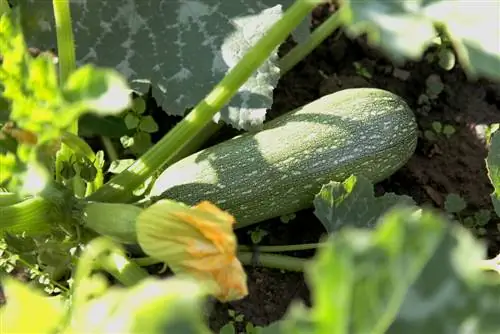
Home-grown zucchini are not safe to eat raw
Hobby gardeners beware. Mixed culture with pumpkin makes every zucchini a good candidate for worry-free raw consumption. This advice is not an exaggerated horror scenario, but is based on solid practical findings. The most common causes of dangerous toxic levels in zucchini are crossing or backcrossing with other cucurbits. Furthermore, the concentration of cucurbitacins increases when stressed due to heat or cold. More rarely, spontaneous changes within a zucchini plant trigger the toxic process. The following tips sum up how hobby gardeners can expertly prevent the risk of poisonous zucchini:
- Avoid breeding experiments: Always grow zucchini with certified seeds
- Don't grow ornamental pumpkins: Avoid crossing and backcrossing by not growing ornamental pumpkins
- Avoid drought stress: Water zucchini regularly, early in the morning or evening in summer heat
- Cold protection: if cold snaps, cover zucchini plants with fleece overnight
A documented death in 2015 shook up the hobby gardening community and drew attention to the problems of backcrossing, unwanted crossing of zucchini with other cucurbits and cultivation stress. The unfortunate zucchini lover pays with his life for eating a casserole. Investigations revealed that the zucchini used came from a hobby garden and contained a high concentration of bitter substances.
Reports of serious zucchini poisoning increased this year as desert-like heat and drought took hold of the country. The Bavarian State Office for He alth and Food Safety then warned against consuming home-grown zucchini and pumpkin without tasting it first.
Tip
Popular vegetables do not show that they belong to the pumpkin family. In addition to Hokaido, Turk's turban and other garden pumpkins, cucumbers and melons also belong to the multifaceted pumpkin family. This is accompanied by the risk of a toxic cucurbitacine concentration as a result of backcrossing, crossing and stress when growing yourself in a hobby garden.
Bitter taste reveals toxins
When zucchini tastes bitter, alarm bells ring. Bitter taste is a sure sign of cucurbitacins. Perfect zucchini, on the other hand, pamper the palate with a mild, sweet aroma. If you want to be on the safe side, you should taste a piece of each fruit before feasting. In principle, it makes sense to sample a zucchini from a hobby garden. How to do it right:
- Wash zucchini with lukewarm water
- cut off a piece with the kitchen knife
- put in mouth and bite
- Spit out the bite at the slightest sign of bitter taste
- dispose of questionable food waste in the organic waste bin
If children have not yet reached primary school age, their sense of taste is usually still developing. This poses the risk that the bitter aftertaste of raw zucchini will not be noticed. We recommend that you act as a taster for your children before serving the delicious dish.
Frequently asked questions
Does eating cucurbitacins in zucchini always make a person sick?

Raw zucchini with a high cucurbitacin content does not always cause problems
The amount of cucurbitacins that cause serious symptoms of poisoning depends on the individual physical constitution of the user. Experience has shown that seniors and small children show severe symptoms after ingesting small amounts of bitter substances. A he althy adult man can sometimes eat an entire bowl of cucurbitacin-containing zucchini salad without feeling any discomfort.
Are zucchini from the supermarket generally safe?
In practice, no poisonous zucchini have yet been discovered in stores. The poisoning cases that received much media attention in 2015 were all due to zucchini grown privately. Experts point out that various scenarios can be considered for the renewed formation of bitter substances in zucchini varieties that have actually been cleaned. These include backcrossing, backmutation and stress factors such as heat and cold. Our recommendation: exercise caution and taste any zucchini that you want to eat raw, fried or boiled.
What does backcrossing mean?
Backcrossing is used in horticulture when a flowering plant is pollinated and fertilized with the pollen of a plant that belongs to the generation of its direct descendants. This term is also used when fertilization occurs between a daughter plant and one of its two parent plants. When growing zucchini, this process always means increased formation of cucurbitacins.
Can you eat zucchini flowers raw?
The beautiful yellow flowers of a zucchini plant are edible. Large flowers are ideal for filling with spicy cream cheese and other delicacies. You can dip small zucchini flowers in batter and deep-fry them. The yellow beauties cut a good figure as an ingredient and eye-catcher in a mixed raw vegetable salad. The warning applies to zucchini flowers from your own vegetable patch: stay away from them if they taste bitter. Toxic bitter substances can form in the flowers as well as in the fruits.
Eat yellow zucchini raw. Is this possible without hesitation?
If you bought yellow zucchini in the store or at the weekly market, you can eat the fruit raw. If the zucchini is home-grown, the presence of toxic cucurbitacins cannot be ruled out. A simple tasting provides information. If you notice a bitter to tart taste, throw away the yellow zucchini.
Tip
A few criteria guarantee a premium quality zucchini harvest. Use certified seeds for sowing from April to the end of May. Regular watering and organic fertilization are mandatory. Harvest the fruits when they are young and tender, 10 to 20 centimeters long. Overripe zucchini tend to produce more cucurbitacins, which can be recognized by their bitter taste.

